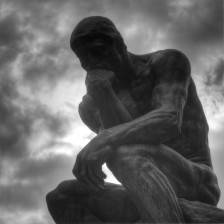Today is World Mental Health Day.
I’ve had my share of mental health struggles, just like anyone else. While medication helps, the far more effective way, to manage mental health issues, I’ve realized is by taking a look at our belief systems on which we’ve constructed our life. Questioning our belief systems and reconstructing that foundation on which our approach to life is dependent, is crucial, if we are to face the challenges of life. I’ve found such insights in the confluence of Stoicism, Taoism and Buddhism.
Become comfortable with anxiety/ambiguity/not knowing: No matter how much we try, we cannot control the flow of life. There’ll always be ambiguity. To quell the discomfort of ambiguity we try to plan to perfection. But, the reality is, there is no way to know if things will go as per plan. That life won’t intervene. So, rather than worry about what else we should do, we need to sit with our anxiety and observe it’s rise and fall. Like Rilke said, “no feeling is final”. When we do that, we notice a distance between our thoughts and ‘us’. We notice, thoughts come and go, like clouds. And, that we are the sky.
‘Peace’ is not a default state of life to keep returning back to: Pema Chodron, a Buddhist nun, says ‘groundlessness’ is the default state of life. That there is no ‘default state’ to return back to. Because we believe we should be living in peace, we get irritated and depressed when something that threatens that peace arises. But, what if ‘peace’ was never the default state? Meditation as co-opted by corporates/new age spirituality has sowed this thought that serene is how we should be. But, the paradox is, serenity is not achieved by pining after it. But, by letting go the pursuit of serenity/peace. When we let that go and observe whatever thoughts/emotions that are arising and falling, we attain a distance from them that translates to peace. The best way to create this space between your thoughts/emotions and ‘you (whoever that is)’ is through meditation.
The obstacle is the way: We all have expectations of life. Like how fast we want to progress in our career, what relation we share with our spouse, how intelligent our children should be and what our bank balance should be. But, we believe in these expectations so much that we forget these are just wishes and plans. We start to believe we are owed these dreams and wishes. So, naturally when things don’t go our way, when obstacles appear, cracks appear in our facade. We become angry, agitated, sad and depressed.
But, the future we dream of, is only in our dreams. Life never promised that’s how tomorrow will turn out to be. Rather than pushing our expectations on life, we need to let life take it’s course. Then, we’ll probably not see obstacle that is impeding the progress in our path. But, realize that the obstacle is the path. That there was never a path without that obstacle (except in our dreams/plans). That now, the only option is, for us to find a way across it.
Though I’ve mentioned the above, it is not always easy to remember them. Especially because of the conditioning of our minds by our environment and well meaning adults/peers. So, I do have occasional bouts of anxiety and depression. But, I’ve come to realize that sticking to these insights is like learning a bicycle. At first we need to make a conscious effort, but over time, we riding becomes unconscious. It is the same for the above insights.
(One point though, if mental health issues are caused due to abuse, then it is paramount to speak up. Everything else comes next.)

Reply